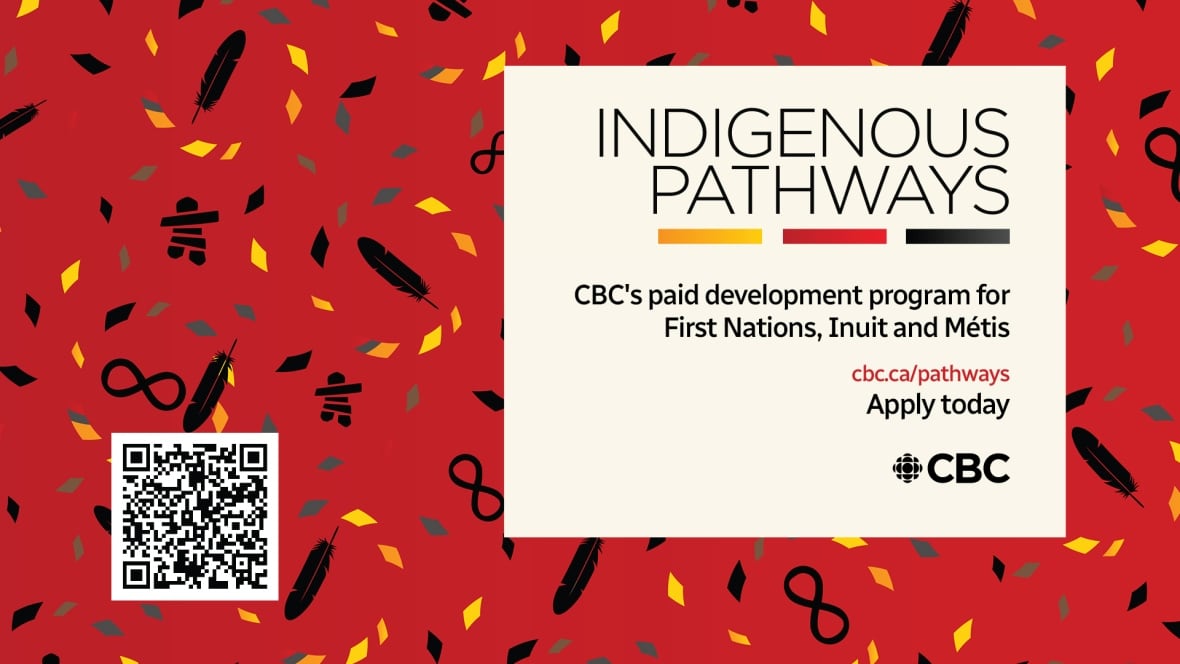Frequently Asked Questions: 2025 CBC Indigenous Pathways program
CBC's paid development program for Indigenous storytellers

Q1. What types of applicants is Indigenous Pathways looking for?
A1. This program is for aspiring First Nations, Inuit or Métis with a deep interest in multimedia production, storytelling and technology. Each host location will have slightly different application questions and criteria to help ensure successful candidates' interests and skills align with local opportunities and support long-term success.
In recruiting for Indigenous Pathways, we know that we all benefit when our workforce is truly diverse. We welcome the unique contributions that you can bring in terms of life experience, culture, ethnicity, race, sex, gender identity and expression, languages spoken, religion, disability, sexual orientation and beliefs.
If you would like to alert us to any specific accommodation needs, please indicate these within your application or by sending an email to pathwaystojournalism@cbc.ca
Q2. I am non-status/don't live in an Indigenous community. Can I apply for this program?
A2. Yes! We are seeking emerging First Nations, Inuit or Métis storytellers who have a connection to their nations, communities or settlements. You do not need to be currently living in an Indigenous nation, community or settlement, nor do you require a status card, to apply.
Q3. Will participants be working on Indigenous-focused content and projects?
A3. The program is designed to empower aspiring Indigenous talent to develop careers in media. Scope of work will differ from one role to the next, so please check the postings that are of interest to you to learn more about what will be involved. In this program, all participants will:
- Develop skills and tools for advancing careers in media
- Work in, and learn to navigate, a multiplatform public service media company offering news, information, entertainment and sports programming through websites, streaming services, podcasts, TV and radio
- Grow relationships with, and be supported by, mentors, trainers, peers, and Indigenous colleagues
- Gain valuable professional experience and career development opportunities
Q4. Does the program take place in person, hybrid format or remotely?
A4. The program is designed in a hybrid format, with some time required in person at a CBC location and other time dedicated to self-directed activities and virtual sessions that can be done in person or remotely. Some roles require a near full-time presence in person at a CBC location, while others can be done from anywhere in Canada. Please check the postings you are interested in to ensure that the options for hybrid work align with your needs.
Q5. Is there a relocation allowance?
A5. There are no relocation or living allowances/expenses covered for this program. Candidates should apply for roles in locations where they are able to live and work. For the duration of the program, including training, participants will receive a salary. Successful candidates are also eligible for a lump sum transition fund, in recognition of commitment to the 9-month program, to be granted on the start date. Yellowknife is subject to the Rule on the Isolated Location Program, so isolated living allowances will apply for that role.
Q6. Is there travel involved as part of the program?
A6. The group will come together in person for two, one-week gatherings in the fall and the spring, which will require travel for some participants. As candidates complete training and begin work placements over the course of the program, there may also be in-the-field assignments involving limited travel. These travel costs will be covered by the program.
Q7. What are the hours of work?
A7. The placements are full time, based on a 38.75 hour work week. Schedules for start and end times are subject to change as participants engage in different training and work experiences throughout the 9 months of the program, and participate in some full-day virtual training courses from different time zones.
Q8. If I am selected for the program, what would my position and salary be?
A8. Each successful candidate will be hired on a full time 13+ week temporary contract for the duration of the program, as an Associate Producer, Researcher or Analyst, with a base annual salary of approximately $60k, prorated for the duration of the program and according to collective agreements of the host locations.
Q9. When will I receive my first paycheck?
A9. CBC pay periods are two weeks backdated, which means your first paycheck will be received 3-4 weeks following your start date.
Q10. Does the paid position include benefits?
A10. CBC offers a comprehensive benefits package to its employees. You can read more on the Working with Us page of our website.
Q11. When will the program take place?
A11. Applications close on August 10, 2025. Placements for successful candidates will begin on October 6, 2025 and end on June 30, 2025.
Q12. Where does the program take place?
A12. This year, we have opportunities in the following host locations.
- CBC Nova Scotia (Halifax)
- CBC Kids (Toronto)
- CBC Marketing & Communications (Toronto)
- CBC Sports (Toronto)
- CBC Saskatchewan (Regina or Saskatoon)
- CBC North (Yellowknife)
- CBC British Columbia (Vancouver)
- DSP Accessibility (Toronto or remote)
- DSP Quality Engineering (Toronto or remote)
- CBC Unscripted Content (Toronto)
- DSP Customer Experience (remote anywhere in Canada)
Q13. What happens at the end of the program? Will there be an opportunity for other work with CBC?
A13. The program is an important stepping stone and its goal is to support individuals interested to develop careers with the CBC. While there is no guarantee of a permanent job with the CBC immediately after completion, the program offers career development support and aims to connect participants with longer-term employment opportunities at CBC. To date, most program graduates have moved onto other positions at CBC.
For more information about the program, please visit cbc.ca/pathways or email us at indigenous.strategy@cbc.ca.